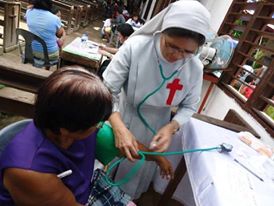 The Province of Italy: speaking about the Gospel today in the world of health and health care. Recommendations.
The Province of Italy: speaking about the Gospel today in the world of health and health care. Recommendations.
The aim of the mission of the Church in the world of health and health care is evangelisation. By this word we do not refer only to an aspect of the activity of the Church, but, rather, to the whole of her mission which expresses in the proclaiming of the Word that integral salvation that Jesus Christ, who died and rose again, communicated to men, which she also actuates in the sacraments and bears witness to in life
In the gospel the commandment of Christ, ‘go and cure’, is always united to ‘go and teach’ and ‘go and baptise’. Jesus never separates his healing activity from the proclaiming of the Kingdom. ‘Curing the sick’, ‘proclaiming the Kingdom’, and integrating men and women into the community of believers, are complementary aspects of the Church’s evangelising activity.
In engaging in pastoral service we are called to foster a better osmosis between proclaiming, the liturgy and the service of charity. The interaction of these three functions is so important that without the other two one of them on its own would run the risk of losing efficacy.
Words, sacramental acts, attitudes and charitable works are not separate from each other, but, rather, they are in constant inter-communication. Indeed, what is proclaimed is God’s plan of love for men; what is celebrated is the Lord’s love for men, a broken body and blood that is shed; proclaiming and celebration are for love between brothers.
In infusing gospel elements into the fabric of the health-care world we help men to live illness and health, pain and death, and service, in a more human way, opening up to that hope that never disappoints the deepest aspirations of the human heart.
Proclaiming



In committing ourselves to proclaiming the good news in the world of health and health care, we are aware of the ‘fracture between the gospel and culture’ (EN, n. 20), which is typical of contemporary society and in particular the Western world. We are dealing here with ‘The spiritual and moral process of a significant number of believers as well, which induces in them attitudes of defence, if not rejection, as regards transcendence and spiritual and moral values. Some realities typical of the health-care world have been affected: the concepts of life, of health and of illness, the presence and the purpose of pain in human life, the meaning of death, and the value of service to those who suffer’.





